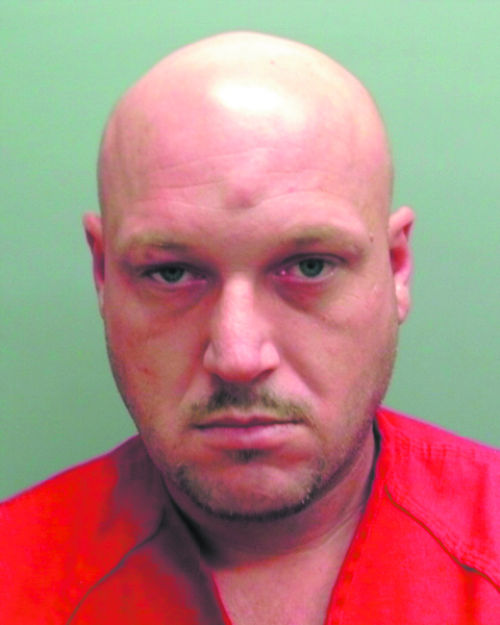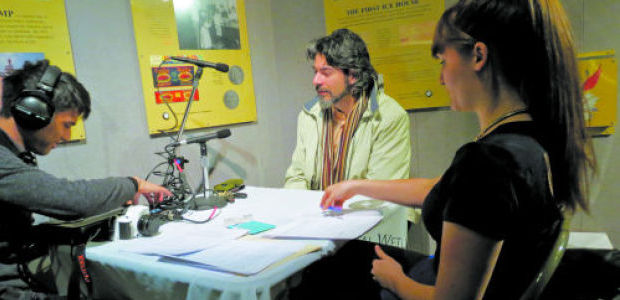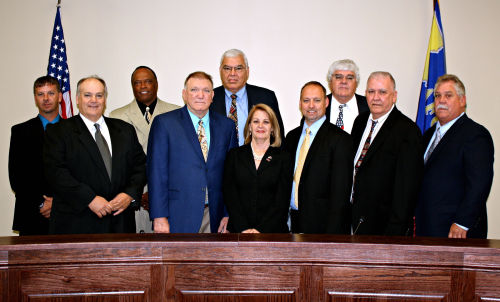
Lockport death case avoids delay
November 20, 2013
‘I Remember’ New exhibit puts human face on state’s disappearing coastline
November 20, 2013As dust settles around the rejection by Lafourche Parish voters of a library tax rededication to help pay for a new jail, emotions continue to swirl over comments attributed to an elected official in connection with the issue.
Lafourche Council Chairman Lindel Toups has in the course of a week denied making a statement offensive to Latino residents as well as low-income people, stated the quote was only partially correct, and also that if he did make the statement he had no understanding that it would be quoted.
Those protests ring hollow with many locals – Hispanic and non-Hispanic – and have done nothing to blunt harsh coverage in national news blogs reflecting poorly not only on Toups but on the parish and the region.
Interviews over the past week indicate that for many local Latinos and their advocates, the statement reflects an attitude they are all too familiar with. Some harbor hope that accountability on the part of Toups might result in greater soul-searching by the community at large, though they are not holding their breath.
“They’re teaching Mexicans how to speak English,” the council chairman said in reference to Biblioteca Hispana, a Hispanic-language segment of the Golden Meadow library branch. “Let that son of a bitch go back to Mexico. There’s just so many things they’re doing that I don’t agree with. … Them junkies and hippies and food stamps (recipients) and all, they use the library to look at drugs and food stamps (on the Internet). I see them do it.”
The quote is among those staff writer Eric Besson harvested during a telephone interview with Toups on Friday, Nov. 8, shortly before noon.
In a telephone interview Saturday, Toups said he does not recall any such conversation. Besson conducted the interview during a period of about 10 minutes, while in the T-PT newsroom on La. Highway 311, in the presence of colleagues, and immediately spoke with an editor afterward.
“I don’t remember saying that,” Toups said of the pejorative phrase. “I remember saying about saving money, about stop giving food stamps.”
Any reference he might have made, Toups said, was to people who come to Lafourche “and send their money home and in 10 years they can retire. I have nothing against Mexicans or any race … I get emotional, I might have said it. But it surprised me when I seen that.
“It’s not a true reflection of what I believe. Anybody wants to work for a living they deserve to make money. If they are here illegally, they ought to send them back.”
Toups stressed a distinction in the conversation he has told some media outlets he never had, that his target was people in the country illegally.
Toups’ words made it across the country, to the Los Angeles Times. Their story noted that the often-fiery councilman’s son and grandson were both arrested in 2009 and charged with possession of methamphetamine and drug paraphernalia.
The Los Angeles Times story focused primarily on the library issue; A Huffington Post story was more blunt with a headline reading “This Louisiana official hates it when Mexicans learn.”
The highly political blog RedState.com took an understandably political bent, stating that President Barack Obama and Sen. Mary Landrieu, D-La., must denounce Toups’ comments, since he is a fellow Democrat.
Esquire magazine’s online blog approached Toups with characteristic literary snark, stating that deep in the heart of Louisiana “amongst the bayous and gators, something wicked is stirring, and we don’t mean the creatures of True Blood. No, not a vampire or werewolf or shape shifting bartender; just regular good ol’ boy Lafourche Parish Council Chairman Lindel Toups, working overtime to keep those uneducated, inbred, hayseed Cajun hillbilly stereotypes alive and well, and in the process providing some political sound bites … apparently in-line with what’s popular amongst certain redneck law types way down yonder.”
The Esquire blurb included a photo of actor Billy Redden, in his role as the banjo-playing boy in the movie “Deliverance.” That story takes place in South Carolina. Redden is from Georgia.
While national lampooning of Toups is not likely to last long, local impacts of his statement may have greater shelf life.
Brent Wilkes, national executive director of the Washington, D.C.-based League of United Latin American Citizens, was among Latino advocates who said Toups’ words were undeniably offensive.
“It is so outrageous I cannot imagine that it is legal,” Wilkes said. “This guy could be taken to court for violating the civil rights of Hispanic residents. He is the council chairman and if he is saying that, he is obviously engaged in disparate treatment of the residents and that is illegal … This represents the absolute worst type of person in the country and we would hope there are very few of them. There are plenty of people here legally that are citizens of the U.S. that were probably even born here in some cases. He has no sympathy for them and is referring to them in a derogatory manner.”
The suggestion that Spanish-speakers learning English is a bad thing boggled the minds of most advocates interviewed last week.
The lumping of local Hispanics of various nationalities as Mexican has long rankled many Latinos and Latinas.
“He should use the library a little bit more himself,” Carmen Gachassin, a native of Bolivia who is married to a man from New Iberia, said of Toups. “If he does go there and spends a couple of hours reading he may learn what an immigrant is, and that everyone who speaks Spanish is not Mexican. The Spanish language is used in so many countries. There are people here from Honduras, Guatemala, Puerto Rico, different areas. Overall, he is offending people of low incomes, people that need to use the computer. The library is a public place. Everybody has the right to use the library and whatever they are using it for is a choice. Everyone in our country is free. What our country is about is freedom and not separation.”
Gachassin, who regularly attends Sunday Mass celebrated in Spanish at a Thibodaux church, is active in Hispanic community affairs. The Hispanics she knows are people she is certain Toups and anyone who shares his views would develop great respect for, if time were spent among them.
“His statement is the statement of a bully,”Gachassin said. “If the library is being used in this capacity and if the library is being used enough, maybe we can get the councilman out of office. He needs to apologize for expressing himself that way about people.”
While the Hispanic vote is nationally a force to be reckoned with, locally that is not the case. Strictly along racial or ethnic lines, Toups’ comments pose little political threat.
Census numbers are generally regarded as inaccurate when it comes to data on Hispanic people in the Tri-parish region.
Census dates from 2012 estimates Lafourche’s population at 4.1 percent; Terrebonne data shows 4.3 percent. St. Mary Parish data identifies 5.7 percent of its people as Hispanic.
In Terrebonne and Lafourche Latino people interviewed with the aid of a translator have said they do at times sense hostility, sometimes just during forays to supermarkets for purchase of essentials.
But most – like Gachassin – say they would rather focus on the positive.
Much of the positives some Latino families encounter here in the bayou country relates to programs from the Diocese of Houma-Thibodaux.
Catholic Charities Administrator Rob Gorman along with his staff and volunteers interact with many local Latinos and are aware of everyday – and sometimes more extraordinary – challenges they face.
Gorman would not comment directly on the Toups imbroglio. But he did note how Catholic teaching, something he is directly familiar with, relates to some of the figurative moral toes it would appear Toups has stepped on, making reference to doctrine not just supported by Catholics, but the Louisiana Interfaith Church Conference.
“On social teaching start with scripture,” Gorman said. “There is a hundred times in the Bible where Yahweh or God or Jesus talks about welcoming the stranger. That is one test of a just society. In the Old Testament the prophets judged the kings and the country on how well they treated the widows, orphans and aliens, the travelers, because they are the chosen people of God.”
By way of example, Gorman cited the words of Jesus in Matthew 25.
“Those who want to get into heaven will welcome the stranger, clothe the naked and feed the hungry.”
Issues that have dissolved into political argument over immigrants and their status, Gorman notes, have evolved into clear policy statements supported by the churches.
“Not just the Catholic Church but the Interfaith Conference focus on four main areas in terms of immigration today,” Gorman said. “The churches are looking for immigration reform that includes a path to citizenship, preserving the family, creating flexible legal limits and due process protections.”
Paths to citizenship proposed in Congress are a step toward those the clergy would approve, Gorman said, but still propose a gauntlet that is tortuous. And the tortuous nature of current national policy is something he and others in social services say they see routinely when it comes to many families of guest workers or the undocumented.
Those expressing insult from Toups’ comments are not limited to Latinos, however.
A Cut Off resident, Lea Callais, e-mailed Lafourche Parish Government Monday morning, expressing her opinion that Toups should resign from his post.
“When Esquire and the Los Angeles Times picked him up it was way too much,” said Callais, who is the disabled wife of an engineer who works for Edison Chouest. “I am thinking that this is going way crazy, for too many years he has said what he wants and had his own agenda. This just proves that he is not competent to make sound judgments on behalf of the people of Lafourche. He has reached a point where he feels he can do and say anything he wants and not be held accountable. I think what he said reinforces a stereotype concerning the South and of Cajun people being ignorant. I don’t think it reflects being bigoted toward Hispanics, more an isolationist way of thinking. If a group of Russians were involved it would be the same thing, isolationism and xenophobia,” she said.
Toups called her Monday morning after learning of her e-mail, asking Callais if she wished to hear his side of the story.
Callais said she did not.
Toups confirmed by telephone Monday evening that he spoke with her and that upon hearing the response told her, “then you must be one of them rich Callais” and hung up. “I said if you don’t want to hear my side of the story then I don’t need to talk to you. There has been a lot of emails, even some even from Minnesota. Some said I should resign but a lot of them backed me up. It doesn’t matter. None of them are from my district.”
Toups said at first he recalled no Nov. 8 conversation with a Tri-Parish Times reporter, but then said “I didn’t say nothing about Mexicans. I did say they have people that take drugs and they get a crazy check and because of that the people have to suffer. The little reporter misunderstood, he got misinformed.”








